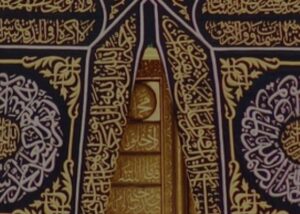Quran
Hadith
Islamic Text
بِسْمِ اللَّهِ الرَّحْمَنِ الرَّحِيمِ
In the Name of Allah Most Merciful Most Kind
Short Answer
No, Ruqyah is not permitted if the words being recited are unclear.
عَوْفِ بْنِ مَالِكٍ الْأَشْجَعِيِّ، قَالَ: كُنَّا نَرْقِي فِي الْجَاهِلِيَّةِ فَقُلْنَا يَا رَسُولَ اللهِ كَيْفَ تَرَى فِي ذَلِكَ فَقَالَ: اعْرِضُوا عَلَيَّ رُقَاكُمْ، لَا بَأْسَ بِالرُّقَى مَا لَمْ يَكُنْ فِيهِ شِرْكٌ
Awf bin Malik al-Ashja’i (May Allah Most High be pleased with him) said: We used to recite Ruqyah in pre-Islamic times, so we said, O Messenger of Allah ﷺ, how do you see that? He ﷺ said, ‘Present your Ruqyah to me. There is nothing wrong with Ruqyah as long as it does not involve Shirk (polytheism).’ (Muslim 2200 – 64).
What is Ruqyah?
Ruqyah is to recite something with the intention of seeking a cure. Therefore, it is only permitted with Quran or Sunnah. As such, Ruqyah is not permitted if the recitation is unclear. In the Hadith above, even the Sahabah were commanded to check the Ruqyah they were reciting with the Prophet ﷺ. Consequently, people engaged in Ruqyah must check to make sure what they are reciting is from the Quran and Sunnah.
Unclear recital
Unfortunately, there are many people claiming to recite Ruqyah over others but they are not reciting from Quran and Sunnah. Very often they mutter something unclear and then blow upon the person. Further, there are others who simply blow upon people without any recital. All of this is contrary to the Islamic teaching and must be avoided.
وأمّا الرقي والاسترقاء، فما كان منه من رقي الجاهليّة أو بما لا يعرف، فواجب اجتنابه على سائر المسلمين. (المفهم لما أشكل من تلخيص كتاب مسلم)
As for Ruqyah and the seeking of it, any Ruqyah based on ignorance or something that is not known, is obligatory for all Muslims to avoid. (Imam Abu al-Abbas al-Qurtubi, al-Mufhim).
الدعوات المأثورة، وأسماء الله الحسنى، وما يجري مجرى ذلك. وفيه تنبيه على الترقي عن أباطيل أهل الجاهلية فيما كانوا يتعاهدونه في الرقي من أسماء الشياطين، والإتيان فيها بما يخل بالعقائد، واستعمال ألفاظ لا يعرف معناها. (الميسر في شرح مصابيح السنة)
(Ruqyah should be) the narrated supplications, the Most Beautiful Names of Allah (Most High), and what aligns with it. Thus, there is a warning against: Ruqyah with the falsehoods of the people of ignorance [such as] regarding Ruqyah with the names of devils [that] they used to recount; reciting things that undermine sound beliefs; and using words whose meanings are not known. (Imam al-Turibishti, al-Maseer).
(ولا يسترقون) أي: برقى الجاهلية وما لا يعقل معناه دون القرآن والأذكار النبوية. (التوشيح شرح الجامع الصحيح)
(And they do not seek Ruqyah) meaning: the Ruqyah of ignorance and that which is not understood instead of the Qur’an and the Prophetic Dhikr. (Imam al-Sayuti, al-Towsheeh).
The danger of Shirk
As well as the prohibition upon reciting something other than Quran and Sunnah, the scholars warned against the possibility of Shirk (polytheism). Therefore, the Muslim must be very careful when seeking Ruqyah. As such, If Ruqyah is not the clear recital of Quran and Sunnah, then it must be avoided.
واتفقوا على أن كل رقية وتعزيم أو قسم فيه شرك بالله فإنه لا يجوز التكلم به وكذا الكلام الذي لا يعرف معناه ولا يتكلم به لإمكان أن يكون فيه شرك لا يعرف. ولذا قال النبي صلى الله عليه وسلم لا بأس بالرقي ما لم تكن شركا. (اتحاف السادة المتقين بشرح إحياء علوم الدين)
They agreed that every Ruqyah, recital, or oath that contains associating partners with Allah (Most High) is not permissible. Nor is it permissible to utter words whose meaning is not known. This is due to the possibility that they contain shirk (polytheism) that is not known. That is why the Prophet ﷺ said: There is no harm in Ruqyah as long as it is not Shirk (polytheism). (Ithaaf al-Sadah, Imam Murtada al-Zabidi).
بِالرُّقَى الَّتِي لَيْسَتْ فِي الْقُرْآنِ وَالْحَدِيثِ الصَّحِيحِ كَرُقَى الْجَاهِلِيَّةِ وَمَا لَا يُؤْمَنُ أَنْ يَكُونَ فِيهِ شِرْكٌ. (فتح الباري شرح صحيح البخاري)
Ruqyah that is not in the Qur’an nor the authentic Hadith such as Ruqyah of ignorance and that which is not known to be free of polytheism (must be avoided). (Imam Ibn Hajr al-Asqalani, Fath al-Bari).
Concluding Remarks
Islam is different to other religions. This is because when it comes to religious and spiritual matters, we restrict ourselves to the Quran and Sunnah. Additionally, we do not open the doors for people to introduce their own practices. If we do this, then there is little difference between us and people of other religious traditions.
Further, sticking to the revelation of Allah (Most High) protects us and keeps us in the light. As such, when Muslims move away from this then they may enter a state of darkness and corruption. And so, many people who regularly visit people of Ruqyah are in a state of confusion and anxiety. However, This should not be the case.
Taking everything mentioned above into consideration, it is important to understand that the recommendation is for one to carry out Ruqyah upon oneself and not go to other people for it. Consequently, if this recommendation is adhered to, then people will be safeguarded from incorrect and dangerous practices.
And Allah Most High Knows Best.
–Answered by Shaykh Noorud-deen Rashid (01.11.23)






